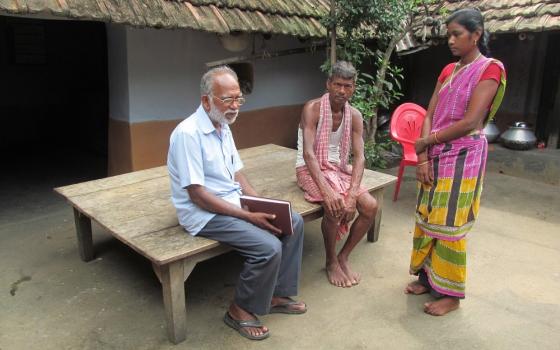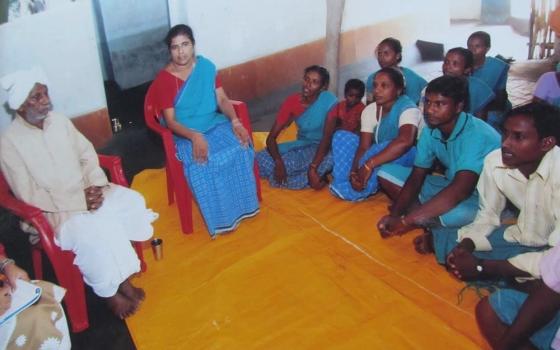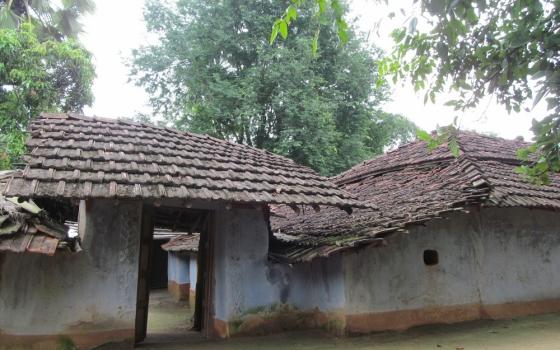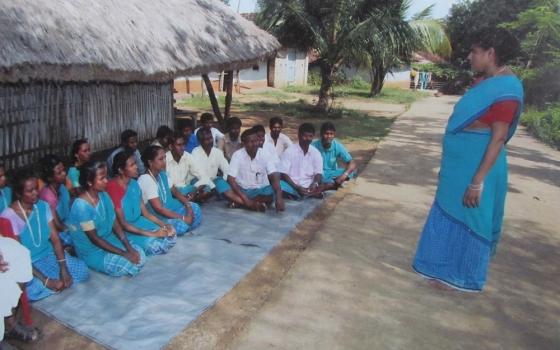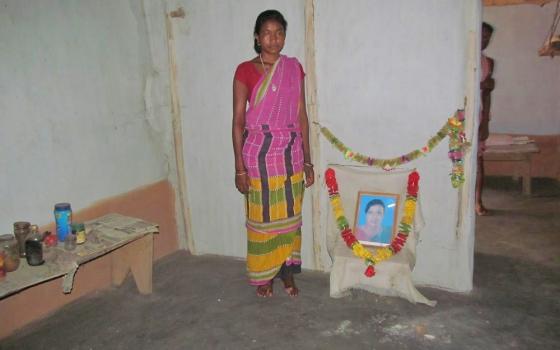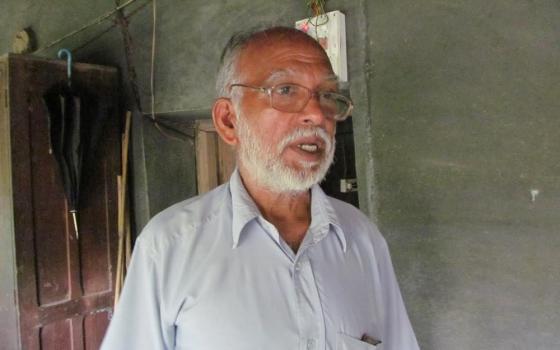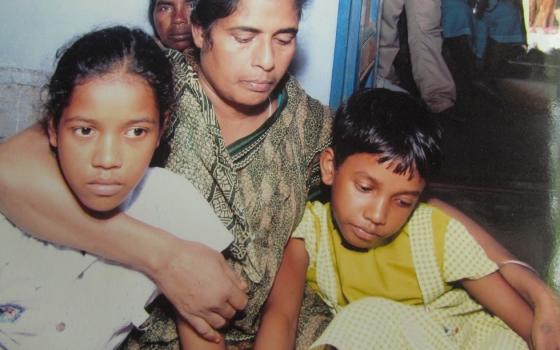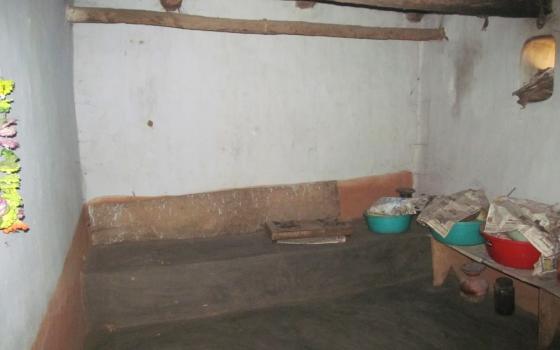Five years ago Sr. Valsa John Malamel was killed in a remote eastern Indian village. The tribal people among whom she had worked say they feel orphaned even now.
"We are in a miserable condition as there is no one now to help us," says Sonia Dehri, who was associated with the slain nun's efforts to protect the land and rights of tribal people in Jharkhand state from heavy coal-mining interests.
Malamel, a member of the Sisters of Charity of Jesus and Mary congregation, was hacked to death by a throng of men at about 11 p.m. on November 15, 2011, inside her small hut in Pachwara village in the center of the Santhali tribal region. She was 53.
See also: Sister Valsa John’s admirers marked her fifth “martyrdom day” in New Delhi November 12, 2016.
Malamel had drawn anger for spearheading a public movement against the PANEM Coal Mines Ltd. project, which displaced thousands of Santhal tribal families in Pachwara and its surrounding villages, Dehri says. The nun had worked to restore the rights and dignity of illiterate villagers in 15 years of struggle, he adds.
Malamel's struggle and murder drew worldwide media attention. Her story has become a touchstone for the impact of mining in eastern India where illiterate tribal people without means join the "mining mafia" that takes payments from mining companies to counter protests and engages in a black market for coal.
Left bereft are the villagers, who routinely, whenever they faced disease or family problems, went to Malamel first before going to the hospital or the police, Dehri recalls. "Now, we feel orphaned," he says.
In October 2015, a trial court sentenced 16 young tribal men accused of murdering Malamel to life imprisonment. However, an appellate court granted bail to all but one, allowing them to move freely in the villages. The appeal disputes the murder convictions because the men's names were not included in the original police report, although they were later added after witnesses came forward.
But Malamel's associates, villagers and Jesuit Fr. Thomas Kavalakatt, who helped procure witnesses for the trial, expressed certainty that the young men were bribed by company operatives with money and liquor to eliminate the sister. No official PANEM employees were arrested.
The company did not respond to an email request for comment.
But the motives for Malamel's murder overlap. PANEM filed suits against her when she organized public protests of mining on tribal lands. She later negotiated that the villagers get a share of the mine's profits, a rarity among extraction operations on indigenous lands. During an expansion of mining in the area in 2011, when Malamel was tending her dying brother out of state, word among the locals was that the company was going to bar her return to the village. She came back despite the warning; she was murdered a week later.
Today the mines are closed. The company wound up its operation following a Supreme Court order in September 2014 after it was found the mining license was obtained through illegal means.
The immediate reason for Malamel's death, however, may have pertained to her insistence on getting a rape case registered with police. The victim was Malamel's friend, who was attacked during the sister's absence. The victim and her family were denied the right to file a police report. When Malamel returned, she and the victim tried again, to no avail. She then contacted the highest authority in the district, who agreed to meet with her and the victim on November 16, 2011. Malamel was murdered the night before the appointment. The accused rapist was among the 16 convicted in her slaying and remains in prison.
The sister's tragic death ended all welfare activities in the villages "as no one was willing to take her place, fearing backlash from those who got her eliminated," Dehri told Global Sisters Report.
He and other villagers say they are frightened by the presence of Malamel's assassins among them. Her closest supporters, in particular, fear a backlash if they openly speak about the case. An attempt to photograph the mine for this story was abandoned as one of the convicted murderers out on bail watched and drank with a group at the roadside.
A few villagers, such as Dehri, mustered courage to talk about the nun they call "Didi" (pronounced DEEdee, meaning "elder sister").
Munshi Hembrom, owner of the house where Malamel lived, said that immediately after the murder the killers made threats of dire consequences "if we had told their names to the police." His house is just a few meters from Malamel's small house, which they now preserve as a monument in her memory.
The night of the murder
Suraj Muni Hembrom (Hembrom is a common surname in the village), one of Malamel's aides and an eyewitness to her murder, recalls how some 40 men armed with axes, knives and bows and arrows forced their way into the nun's home in the middle of the night.
"They searched for Didi and found her standing in the corner helplessly. They tried to pull her out but she resisted. They then slashed her with a long knife. She died on the spot," Suraj Muni Hembrom, 26, recalls.
Munshi Hembrom says that the villagers were worried about the nun's life and had deputized three young men to keep guard outside her home at night and accompany her wherever she went, even in a group of 25. (In the past, Malamel had sought and been denied police protection after regularly receiving death threats.)
"On the fateful day, the culprits took away the youths at gunpoint," he recounts, adding that the young guards were let go after the incident. After murdering Malamel, the attackers left some flyers in her room to give the impression that anti-government Maoist rebels had killed her.
He says his family has not overcome the shock of the murder.
Kavalakatt, the local priest, has noticed a "perceived threat to everyone who had defied the culprits' warning and gave witness in the court."
Even the 66-year-old Catholic priest is on the killers' radar since it was he who had encouraged the villagers to testify in court. "The witnesses had initially refused to cooperate with the police investigation, fearing for their lives," he told GSR.
Kavalakatt's efforts to ensure justice to Malamel led to the court verdict.
'A special love' for the people
Kavalakatt worked with Malamel since 1993. He recalls that the nun had "a special love" for those at the bottom of Indian society. "They live a primitive life in the remote hilly terrains and forest villages with little connectivity to the world outside."
Modernity started making inroads after it was discovered the area has huge reserves of coal, bauxite, iron ore and other minerals, he said. The government encourages mining operations and has set a national target of doubling coal production to 1.5 billion metric tons by 2020. Protests at sites in India, some leading to fatalities, are not uncommon.
The mines began displacing tribal people who had survived by seasonal farming in the forest. Malamel knew the villagers would not make it once they were removed from their usual environment, and she tried to protect their lives and livelihood.
She had quit a teaching job in Kerala, southern India, to join the Sisters of Charity of Jesus and Mary in 1984 because she wanted to serve the poor. She was born on February 19, 1958, as the youngest of six children in a Kerala Catholic family.
Kavalakatt says the real turning point in Malamel's life came in 1998, when she accidentally met a Geological Survey of India team during one of her village visits. She was then teaching in a school managed by her congregation and used to visit villages after school hours.
When the geological team told her that they had come to acquire land for a coal mine, she sensed a great threat to the indigenous people, Kavalakatt recalls.
She mobilized people against the proposed mining project. She requested that her congregation free her to work fully for the tribal people. The superiors agreed and she moved to Pachwara in 1998.
However, the congregation seemed to forget her after she moved out of the convent and did not support her until her death, Kavalakatt says. Even after her death, the congregation has done little to preserve her memorial, her supporters say.
Munshi Hembrom, owner of Malamel's house, says nobody from the congregation has visited the villagers since Malamel died.
The congregation's Ranchi provincial Sr. Lilly Pallipurathu told GSR that they did appreciate Malamel's work. "It was a special call, and she did so much for the poor, which nobody would have done."
However, Pallipurathu admits that there was some disconnect with the congregation, and Malamel "worked independently without consulting the superiors."
The congregation "had given her the option to leave it but she did not leave and, hence, she will continue to be a member of our congregation," the provincial says, adding they remember Malamel and pray for her.
Malamel found acceptance among the tribal people. In her quest to become one with them, Kavalakatt says, Malamel gave up the comforts of a convent life and moved into a small hut with no toilet, "which is unimaginable for a nun today."
"We never felt she was any different from us," says the landlord. "She lived a very humble life with no possession other than one pair of clothes," he recalls.
She survived on the grains and vegetables the villagers provided. She dressed like tribal women, wearing a dhoti (loin cloth), blouse and a shawl that covered her from neck to knees.
Activist for the indigenous
Malamel's main struggle was against PANEM, a joint venture of Eastern Minerals & Trading Agency in Kolkata and the Punjab State Electricity Board, to extract coal to make electricity in Punjab in northern India, explains Kavalakatt.
Kavalakatt says he had witnessed Malamel's fighting spirit in 1993 when she fought to protect a hill tribe at Kodarma, Sahibganj district. "Although she did not know the Santhali language, she mingled with the women from day one," the priest recalls.
In Pachwara, she began organizing women and sending children to school as she opposed the coal mine. Her efforts took on an air of civil disobedience. In one instance, she organized a village blockade against PANEM and government officials.
Kavalakatt says the mining officials tried to break her hold over the people by enticing some village youth with jobs and money. "The firm, with the help of police, began to arrest and send people to jail on fake charges. The police registered seven criminal cases against Malamel," the priest recalls.
She lost a case against the mine officials in appellate court, prompting her to seek a compromise with them.
Malamel entered into an agreement with the mining firm in 2006, ending an eight-year impasse. The firm agreed to compensate villagers, resettle them in the area, build new houses and facilities, offer free education and medical care, and return the land as farmable after they mined it. The mining started in the same year, but locals say the company did not fulfill its promises.
As she set her mind on getting the agreement implemented, her efforts further irritated the company agents, who looked for a chance to get rid of her, say Kavalakatt and villagers who were interviewed and asked not to be identified.
She went to Kerala for three months in July 2011 to nurse her elder brother who was dying from cancer. During that time, to turn the villagers against her, the mine officials "spread false stories that she had left for good and would never return. They also accused her of decamping with public money," the priest explains, rumors that were never substantiated.
When Kavalakatt heard talk at the market that mine officials planned to bar Malamel from re-entering the village, he notified her.
Malamel, missing her people, defied the threat and returned on November 7, 2011.
The nun herself knew what might await her. She said in an interview with The Globe and Mail in Toronto that summer, "If I go home, most probably they will kill me.
But her decision at the same time to take on a group of men involved in the rape may have hastened her death. The accused rapist, his family and associates pressured police not to act on the case and resolve it outside the law to avoid prosecution, the priest, Dehri and Munshi Hembrom say. But when Malamel persisted in pursuing it, and the November 16 appointment with the high-level authority was set, the flames were fanned.
She was slain the night before.
Hundreds, including 30 or 40 from her congregation, attended her funeral at St. Paul Cathedral, in Dumka diocese, about 40 miles from where she was killed. She is buried in the cathedral cemetery.
Missing Didi
Suraj Muni Hembrom remains inconsolable that their "protective shield" has gone. "If Didi were alive, she would have found solutions for all our problems," she says.
One of the problems is lack of education for children. "More than 350 children have left school as no one is there to teach them," she laments. The village school does not function because it lacks staff and other facilities.
"Didi used to teach our children," says a village woman who did not want to be named.
Suraj Muni Hembrom says the village women had drawn inspiration from Malamel, who "motivated us to stand on our feet whenever attempts were made to take away our rights."
The nun had even slept under trees in the forest, tired after conducting awareness camps around the clock. "Now we have no one to speak for us," she bemoans.
Dehri says they want to keep Malamel's memory alive by developing her hut as a martyr's memorial. "But it is not possible as there is no one to support us," he says.
The sister's impact on those in Pachwara is palpable and lasting. Says her landlord: "We cannot forget our Didi in this life."
[Saji Thomas is a freelance journalist based in Bhopal, a central Indian city. He has worked for several mainstream newspapers such as The Times of India. This article is part of a collaboration between GSR and Matters India, a news portal started in March 2013 to focus on religious and social issues in India.]
